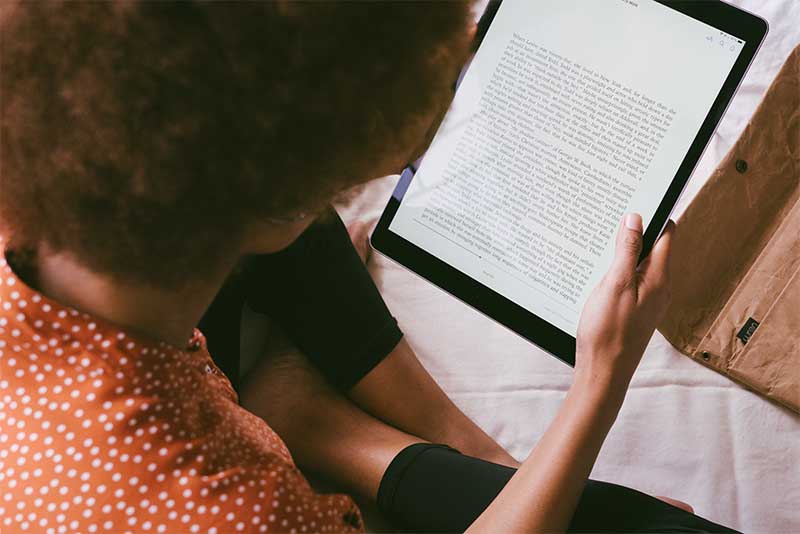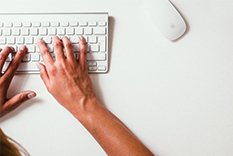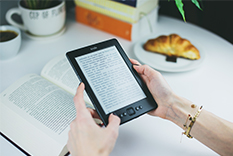
A passion for DIY publishing is written into CE writing instructor Christine Dubois’ DNA. “I grew up around self-publishing,” she says. “My mom (now 94 and still writing) self-published several books on quilting. In those days, you had to pay for the printing and buy a huge number of books and store them in the garage. She promoted her books through speaking and mailing out a newsletter. Customers would send in their orders.”
Dubois says assisting her mother’s homegrown business came with a considerable amount of legwork. “I remember going down to the post office and pulling orders out of our PO box,” she recalls “It was like Christmas! Then the whole family would sit around the dining room table packing books for shipment. Self-publishing—or indie publishing, as we call it now—is much easier today.”
Knowing her way around e-publishing has not only offered Dubois numerous creative possibilities, it has been a platform for personal enrichment. “Recently my mother found a couple of mystery novels she’d written in the 1980s,” she says. “She hadn’t been able to find an agent to represent her, so they were never published. I published them for her as e-books. It felt good to know that technology has advanced to the point where her words are now out in the world. I hope to help students make that same discovery.”
Making public a written work that might otherwise be lost to the sands of time is one of the great benefits of e-publishing. “Self-publishing e-books lets you give new life to old manuscripts, family histories, collections of poetry, essays, letters—anything,” says Dubois. “And, of course, you can publish your new writing—whether novels or nonfiction.”
According to Dubois, when it comes to self-publishing, one genre can find as much success as any other. “Anything can work since readers will be searching for the type of book they’re interested in,” she says. “My husband publishes vampire stories; my mom has a collection of poetry along with her mysteries; and I just published meditations on climate change. The great thing about indie publishing is that there’s room for everyone!”
Being your own boss as a publisher comes with the additional challenge of shouldering marketing and promotional duties. Dubois says this is not as daunting a task as it appears. “Unless you’re already a best-selling author, publishing houses don’t do that much to help you nowadays,” she says. “They expect you to do most of the marketing. So, your job as an indie author isn’t that different. You need to build your platform through speaking, websites, writing, blogging, social media, or whatever means you have available to you. You can also promote your books with digital ads and marketing campaigns. It’s hard for an unpublished author to get a contract with a legacy publisher. Indie publishing lets you jump right in and go direct to your readers.”
Mastering keywords is a big part of successful e-book self-publishing. “Keywords go in your book description,” say Dubois. “They help people find your book online. It’s a question of SEO (Search Engine Optimization). What are the words people would use to search for a book like yours? Be sure you put those in the description.”
Dubois also recommends seeking out other creators to help support you in your publishing efforts. “If you feel a need for expert assistance, it’s available,” she says. “If you’re a beginning writer, you might want to join a writers’ group or hire an editor to help polish your words. But one of the advantages of publishing your own e-books is that it’s not that hard to do it yourself. If you’re willing to put in a little time, you can publish an e-book with very little upfront expense.”
 For many self-publishers, creating a high-profile project with a wide appeal is not the ultimate goal. “Of course, for some projects, you may not care about selling thousands of copies,” says Dubois. “For example, if you have a collection of your great-grandfather’s letters that you want to share with extended family, an e-book is a great way to do that.”
For many self-publishers, creating a high-profile project with a wide appeal is not the ultimate goal. “Of course, for some projects, you may not care about selling thousands of copies,” says Dubois. “For example, if you have a collection of your great-grandfather’s letters that you want to share with extended family, an e-book is a great way to do that.”
Dubois says she looks forward to introducing students to the adventure of indie publishing. “E-books are versatile,” she points out. “Anyone can read them on a Kindle or an app on their phone or tablet. And since they’re generally low cost, there’s not a lot of price resistance.” Additionally, Dubois notes the Self-Publishing Your e-Book will focus on preparing your work for availability on Amazon as they control most of the publishing market, and offer a system that offers e-book authors the opportunity to receive royalties, ranging from 30-70% of the price of the e-book.”
Students joining Self-Publishing Your e-Book class can look forward to assembling a whole new set of tools while becoming autonomous creators. “I’ll be sharing the steps for formatting, publishing, and marketing an e-book,” says Dubois. “My hope is that students will put what they learn into practice and share their words with the world.”
Learn more about Christine Dubois and her classes.